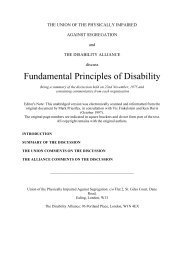Global-Report-Living-Colour-dr2-2
Global-Report-Living-Colour-dr2-2
Global-Report-Living-Colour-dr2-2
You also want an ePaper? Increase the reach of your titles
YUMPU automatically turns print PDFs into web optimized ePapers that Google loves.
136<br />
Inclusive Communities = Stronger Communities<br />
GLOBAL REPORT ON ARTICLE 19: THE RIGHT TO LIVE AND BE INCLUDED IN THE COMMUNITY<br />
not been developed in “family friendly” ways; they<br />
receive little or no information or emotional support<br />
in caring for their family member; they do not receive<br />
compensation for lost income due to caregiving<br />
responsibilities; they have little access to services<br />
which provide short breaks in their caregiving<br />
responsibilities and as they age and become unable<br />
to provide care and support, they have no access to<br />
supports to plan for the future of their family<br />
member. Many of these supports can be developed<br />
in both low and high income countries at the<br />
community level through investments in community<br />
based organizations and existing mainstream services<br />
and programmes. Where some good examples in<br />
public policy have been developed to support the<br />
role of families, concerns have been raised about<br />
reinforcing the dependence of adults with intellectual<br />
disabilities on their families. It must be absolutely<br />
clear that supports to families are not to be used as a<br />
substitute for supports to the individual but rather<br />
without both, inclusion in the community cannot be<br />
achieved.<br />
‰ Even when people with intellectual disabilities live<br />
in the community they are often isolated and<br />
excluded from the community.<br />
In high income countries where service<br />
infrastructures have been developed they continue to<br />
be professionally driven, modelled after institutional<br />
care; segregated and isolating. Governments must<br />
introduce a reorganization of the service delivery<br />
system which requires a paradigm shift by all actors<br />
(disability and other service providers, public policy<br />
actors, families, employers, educators etc.) towards a<br />
system which is directed by the needs and aspirations<br />
of people with disabilities. This shift will mean<br />
changes in a service industry which has been<br />
entrenched in a way of working for many years, but as<br />
with the processes of deinstitutionalization and<br />
inclusive education have taught us, progress requires



